莎翁十四行诗
莎士比亚154首十四行诗
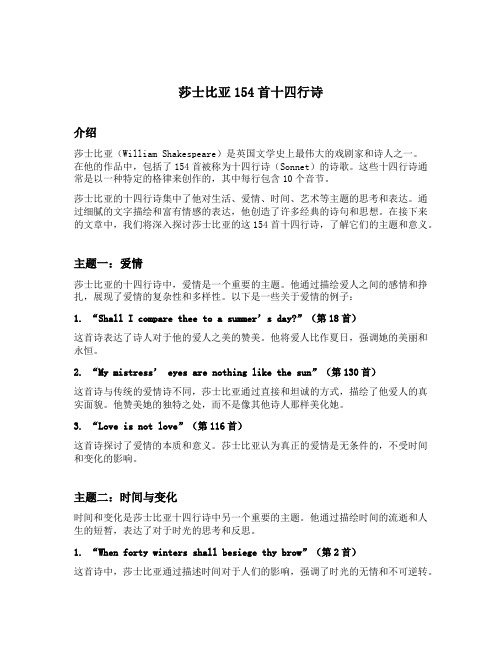
莎士比亚154首十四行诗介绍莎士比亚(William Shakespeare)是英国文学史上最伟大的戏剧家和诗人之一。
在他的作品中,包括了154首被称为十四行诗(Sonnet)的诗歌。
这些十四行诗通常是以一种特定的格律来创作的,其中每行包含10个音节。
莎士比亚的十四行诗集中了他对生活、爱情、时间、艺术等主题的思考和表达。
通过细腻的文字描绘和富有情感的表达,他创造了许多经典的诗句和思想。
在接下来的文章中,我们将深入探讨莎士比亚的这154首十四行诗,了解它们的主题和意义。
主题一:爱情莎士比亚的十四行诗中,爱情是一个重要的主题。
他通过描绘爱人之间的感情和挣扎,展现了爱情的复杂性和多样性。
以下是一些关于爱情的例子:1. “Shall I compare thee to a summer’s day?”(第18首)这首诗表达了诗人对于他的爱人之美的赞美。
他将爱人比作夏日,强调她的美丽和永恒。
2. “My mistress’ eyes are nothing like the sun”(第130首)这首诗与传统的爱情诗不同,莎士比亚通过直接和坦诚的方式,描绘了他爱人的真实面貌。
他赞美她的独特之处,而不是像其他诗人那样美化她。
3. “Love is not love”(第116首)这首诗探讨了爱情的本质和意义。
莎士比亚认为真正的爱情是无条件的,不受时间和变化的影响。
主题二:时间与变化时间和变化是莎士比亚十四行诗中另一个重要的主题。
他通过描绘时间的流逝和人生的短暂,表达了对于时光的思考和反思。
1. “When forty winters shall besiege thy brow”(第2首)这首诗中,莎士比亚通过描述时间对于人们的影响,强调了时光的无情和不可逆转。
2. “So sweet and lovely doth thy time make haste” (第60首)这首诗表达了莎士比亚对于时间的流逝的感叹。
莎士比亚十四行诗原文译文探析

莎士比亚十四行诗原文译文探析莎士比亚(William Shakespeare)作为英国文学史上最重要的艺术家之一,其作品一直被世人推崇。
他的十四行诗(sonnet)尤为著名,这些诗歌探讨了爱情、时间、美丽和死亡等永恒的主题。
本文将深入探讨莎士比亚十四行诗的原文及其中文译文,并分析其中蕴含的深刻意义。
首先我们来看莎士比亚的第一首十四行诗,即《莎士比亚十四行诗之一》。
我们首先注意到的是这首诗歌采用了抑扬格的形式,每行由十个音节组成。
莎士比亚通过这种形式的诗歌,表达了对美丽的渴望和对时间流逝的思考。
诗中他说“我们渴望美好的事物能够繁衍,这样美丽之花永不凋谢。
但是随着时光流逝,其越成熟的身影消逝,而他的后代要承载其记忆。
但是你呀,被局限在自己明亮的双眼里,用自我实质的燃料来滋养你的光芒,使得丰富之处变成了匮乏,你是你自己的敌人,对自己太残忍。
”莎士比亚通过这首诗表达了对美丽的追求,以及对个体自我局限的思考。
对于这首诗歌的中文译文,我们可以感受到译者对文章语言美感的运用,使得诗歌在翻译过程中没有失去原有的意境和氛围。
我们可以注意到这首诗歌的表现手法同样采用了抑扬格的形式,每行也由十个音节组成。
诗中莎士比亚表达了对爱人美好容颜的赞美以及对其永恒之美的祝福。
他说:“我要拿你和夏日作比较吗?你比夏天更可爱更温和:狂风能把五月里娇嫩的花蕾摇得摇摆;夏季风光太短促了。
时而天国之眼的光线太过灼热,经常神色黯淡;任何美景都有它的凋残时刻,无论是偶然或是自然因素的干扰。
但是你的永恒夏日永不凋谢,不会失去那属于你的美;死亡也不能夸耀你在他的阴影下徘徊;当你在永恒的诗行里,与时间一同成长,只要人类能喘息,眼睛还能看,你就会永世长存,这首诗也会永存,并为你赋予生命。
”这首诗歌充满了对爱人的赞美和祝福,表达了作者的深情厚爱。
对于这样一首表达深情的诗歌,在翻译的过程中,译者的语言功底和艺术修养显得尤为重要。
他们需要将原文中的美感和情感完整地传递给读者,使读者在欣赏翻译诗歌时能够感受到原诗所传达的深厚意蕴。
莎士比亚十四行诗精选带翻译
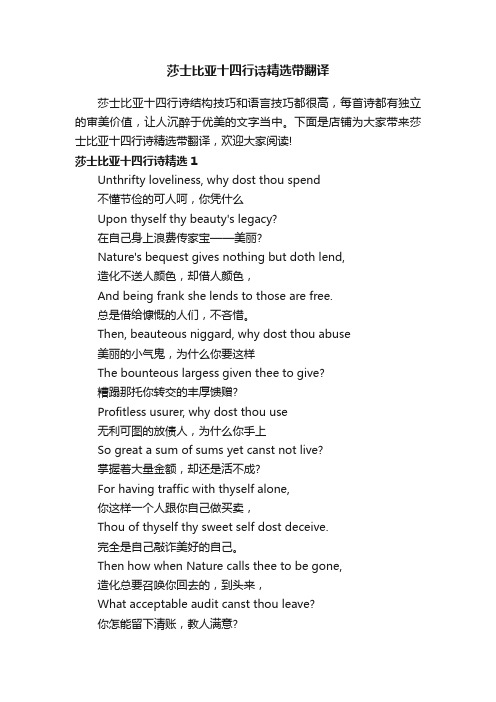
莎士比亚十四行诗精选带翻译莎士比亚十四行诗结构技巧和语言技巧都很高,每首诗都有独立的审美价值,让人沉醉于优美的文字当中。
下面是店铺为大家带来莎士比亚十四行诗精选带翻译,欢迎大家阅读!莎士比亚十四行诗精选1Unthrifty loveliness, why dost thou spend不懂节俭的可人呵,你凭什么Upon thyself thy beauty's legacy?在自己身上浪费传家宝——美丽?Nature's bequest gives nothing but doth lend,造化不送人颜色,却借人颜色,And being frank she lends to those are free.总是借给慷慨的人们,不吝惜。
Then, beauteous niggard, why dost thou abuse美丽的小气鬼,为什么你要这样The bounteous largess given thee to give?糟蹋那托你转交的丰厚馈赠?Profitless usurer, why dost thou use无利可图的放债人,为什么你手上So great a sum of sums yet canst not live?掌握着大量金额,却还是活不成?For having traffic with thyself alone,你这样一个人跟你自己做买卖,Thou of thyself thy sweet self dost deceive.完全是自己敲诈美好的自己。
Then how when Nature calls thee to be gone,造化总要召唤你回去的,到头来,What acceptable audit canst thou leave?你怎能留下清账,教人满意?Thy unused beauty must be tombed with thee,美,没有用过的,得陪你进坟墓,Which, used, lives th' executor to be.用了的,会活着来执行你的遗嘱。
莎翁十四行诗译文翻译美文阅读

莎翁十四行诗译文翻译美文阅读莎士比亚十四行诗集,是歌颂友情和爱情的最美抒情诗。
今天店铺在这里为大家分享一些莎翁十四行诗的译文,欢迎大家阅读!莎翁十四行诗译文篇1Sin of self-love possesseth all mine eye自爱这罪恶占据着我的眼睛,And all my soul and all my every part;我整个的灵魂和我身体各部;And for this sin there is no remedy,而对这罪恶什么药石都无灵,It is so grounded inward in my heart.在我心内扎根扎得那么深固。
Methinks no face so gracious is as mine,我相信我自己的眉目最秀丽,No shape so true, no truth of such account;态度最率真,胸怀又那么俊伟;And for myself mine own worth do define,我的优点对我这样估计自己:As I all other in all worths surmount.不管哪一方面我都出类拔萃。
But when my glass shows me myself indeed,但当我的镜子照出我的真相,Beated and chopp'd with tann'd antiquity,全被那焦黑的老年剁得稀烂,Mine own self-love quite contrary I read;我对于自爱又有相反的感想:Self so self-loving were iniquity.这样溺爱着自己实在是罪愆。
'Tis thee, myself, that for myself I praise,我歌颂自己就等于把你歌颂,Painting my age with beauty of thy days.用你的青春来粉刷我的隆冬。
莎士比亚经典十四行诗附译文

莎士比亚经典十四行诗附译文莎士比亚十四行诗结构技巧和语言技巧都很高,每首诗都有独立的审美价值,让人沉醉于优美的文字当中。
下面是店铺为大家带来莎士比亚经典十四行诗附译文,希望大家喜欢!莎士比亚经典十四行诗一Love is too young to know what conscience is;Yet who knows not conscience is born of love?Then, gentle cheater, urge not my amiss,Lest guilty of my faults thy sweet self prove:For, thou betraying me, I do betrayMy nobler part to my gross body's treason;My soul doth tell my body that he mayTriumph in love; flesh stays no father reason;But, rising at thy name, doth point out theeAs his triumphant prize. Proud of this pride,He is contented thy poor drudge to be,To stand in thy affairs, fall by thy side.No want of conscience hold it that I callHer 'love' for whose dear love I rise and fall.莎士比亚经典十四行诗译文爱神太年轻,不懂得良心是什么;但谁不晓得良心是爱情所产?那么,好骗子,就别专找我的错,免得我的罪把温婉的你也牵连。
因为,你出卖了我,我的笨肉体又哄我出卖我更高贵的部分;我灵魂叮嘱我肉体,说它可以在爱情上胜利;肉体再不作声,一听见你的名字就马上指出你是它的胜利品;它趾高气扬,死心蹋地作你最鄙贱的家奴,任你颐指气使,或倒在你身旁。
莎士比亚经典十四行诗译文
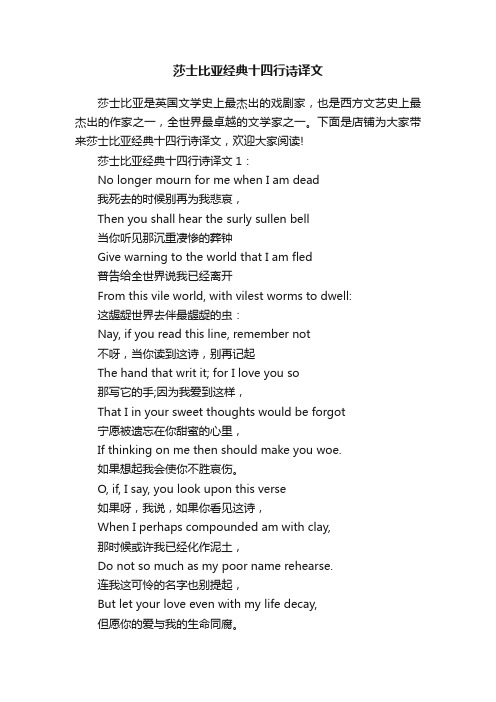
莎士比亚经典十四行诗译文莎士比亚是英国文学史上最杰出的戏剧家,也是西方文艺史上最杰出的作家之一,全世界最卓越的文学家之一。
下面是店铺为大家带来莎士比亚经典十四行诗译文,欢迎大家阅读!莎士比亚经典十四行诗译文1:No longer mourn for me when I am dead我死去的时候别再为我悲哀,Then you shall hear the surly sullen bell当你听见那沉重凄惨的葬钟Give warning to the world that I am fled普告给全世界说我已经离开From this vile world, with vilest worms to dwell:这龌龊世界去伴最龌龊的虫:Nay, if you read this line, remember not不呀,当你读到这诗,别再记起The hand that writ it; for I love you so那写它的手;因为我爱到这样,That I in your sweet thoughts would be forgot宁愿被遗忘在你甜蜜的心里,If thinking on me then should make you woe.如果想起我会使你不胜哀伤。
O, if, I say, you look upon this verse如果呀,我说,如果你看见这诗,When I perhaps compounded am with clay,那时候或许我已经化作泥土,Do not so much as my poor name rehearse.连我这可怜的名字也别提起,But let your love even with my life decay,但愿你的爱与我的生命同腐。
Lest the wise world should look into your moan 免得这聪明世界猜透你的心,And mock you with me after I am gone.在我死去后把你也当作笑柄。
莎士比亚的诗

莎士比亚的诗莎士比亚(1564年4月23日-1616年4月23日),华人社会常尊称为莎翁,是英国文学史上最杰出的戏剧家,也是欧洲文艺复兴时期最重要、最伟大的作家之一,当时人文主义文学的集大成者,以及全世界最卓越的文学家之一。
莎士比亚诗如下:1、《十四行诗》当我看到,一切生长之物,只在刹那间能够完美;世界舞台上一无所有,唯有星辰在秘密中牵引。
我看到人类像草木一样生长,被同样的天空赋予盛衰。
少时繁茂,日中则仄,一切美好都从记忆中被抹去!于是这瞬间停留的诡计,让你青春的容颜出现在我面前。
而残暴的时间和腐朽商议,要把你青春的白日变成暗淡黑夜,为了爱你,我将和时间对抗,它从你身上夺走的,我会重新嫁接。
2、《哈姆雷特》内心之事宜缄口,仓促之念莫妄行,为人友善忌轻浮,患难之友可深交,酒肉之情应远离。
3、《哈姆雷特》生存或毁灭,这是个必答之问题:是否应默默的忍受坎坷命运之无情打击,还是应与深如大海之无涯苦难奋然为敌,并将其克服。
此二抉择,究竟是哪个较崇高?死即睡眠,它不过如此!倘若一眠能了结心灵之苦楚与肉体之百患,那么,此结局是可盼的!死去,睡去……但在睡眠中可能有梦,啊,这就是个阻碍:当我们摆脱了此垂死之皮囊,在死之长眠中会有何梦来临?它令我们踌躇,使我们心甘情愿的承受长年之灾,否则谁肯容忍人间之百般折磨,如暴君之政、骄者之傲、失恋之痛、法章之慢、贪官之侮、或庸民之辱,假如他能简单的一刃了之?还有谁会肯去终生做牛做马。
shakespeare(sonnet) 英国文学 十四行诗
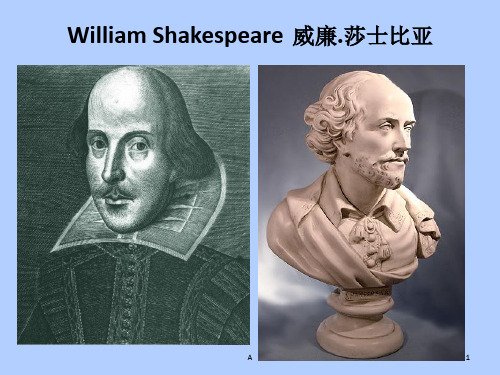
A
1
Who is Shakespeare?
A
2
艾汶河上斯特拉斯福:莎翁故居及塑像
A
3
莎翁部分作品:Some Works
A
4
Poems
• Poems: • I narrative: ballad, epic • II dramatic: dramatic monologue • III lyric (dealing with emotions, feelings): sonnet, ode,
happiness eyes
thine
yours the possessive pronoun
Verbs after second person subject should end with (e)st thou would(e)st thou hast thou wast thou didst thou singest thou growest
• The rhyme scheme is as follows: First stanza (quatrain): ABAB; Second stanza (quatrain): CDCD; Third stanza (quatrain): EFEF; Couplet: GG.
A
12
Early Modern English Grammar
A
11
Rime scheme
• Petrarchan (Italian) rime scheme: abba, abba, cd, cd, cd abba, abba, cde, cde
• The Shakespearean (English, or Elizabethan) sonnet is also called the English sonnet, with three four-line stanzas (quatrains) and a two-line unit called a couplet (对子).
莎士比亚经典十四行诗欣赏

莎士比亚经典十四行诗欣赏莎士比亚是英国文学史上最杰出的戏剧家,也是西方文艺史上最杰出的作家之一,全世界最卓越的文学家之一。
他流传下来的作品包括37部戏剧、155首十四行诗、两首长叙事诗和其他诗歌。
他的戏剧有各种主要语言的译本,且表演次数远远超过其他任何戏剧家的作品。
下面是店铺为大家带来莎士比亚经典十四行诗欣赏,希望大家喜欢!莎士比亚经典十四行诗:When thou shalt be disposed to set me light,And place my merit in the eye of scorn,Upon thy side against myself I'll fight,And prove thee virtuous, though thou art forsworn.With mine own weakness being best acquainted,Upon thy part I can set down a storyOf faults conceal'd, wherein I am attainted,That thou in losing me shalt win much glory:And I by this will be a gainer too;For bending all my loving thoughts on thee,The injuries that to myself I do,Doing thee vantage, double-vantage me.Such is my love, to thee I so belong,That for thy right myself will bear all wrong.当你有一天下决心瞧我不起,用侮蔑的眼光衡量我的轻重,我将站在你那边打击我自己,证明你贤德,尽管你已经背盟。
对自己的弱点我既那么内行,我将为你的利益捏造我种种无人觉察的过失,把自己中伤;使你抛弃了我反而得到光荣:而我也可以借此而大有收获;因为我全部情思那么倾向你,我为自己所招惹的一切侮辱既对你有利,对我就加倍有利。
莎士比亚最经典的九首十四行诗
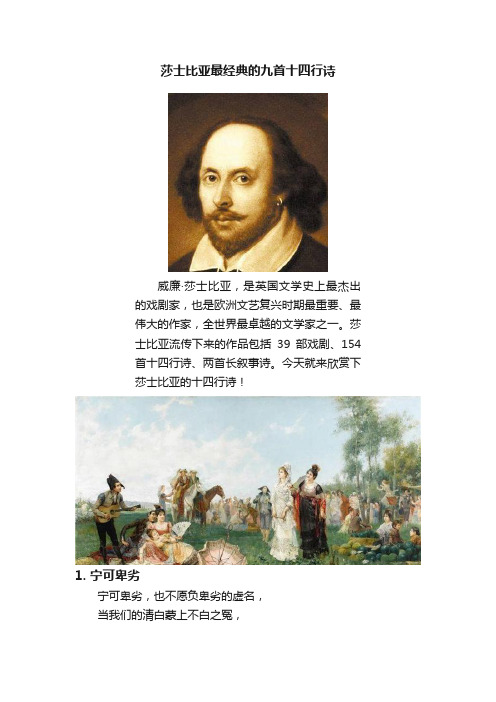
莎士比亚最经典的九首十四行诗威廉·莎士比亚,是英国文学史上最杰出的戏剧家,也是欧洲文艺复兴时期最重要、最伟大的作家,全世界最卓越的文学家之一。
莎士比亚流传下来的作品包括39部戏剧、154首十四行诗、两首长叙事诗。
今天就来欣赏下莎士比亚的十四行诗!1. 宁可卑劣宁可卑劣,也不愿负卑劣的虚名,当我们的清白蒙上不白之冤,当正当的娱乐被人妄加恶声,不体察我们的感情,只凭偏见。
为什么别人虚伪淫猥的眼睛有权赞扬或诋毁我活跃的血?专侦伺我的弱点而比我坏的人为什么把我认为善的恣意污蔑?我就是我,他们对于我的诋毁只能够宣扬他们自己的卑鄙:我本方正,他们的视线自不轨;这种坏心眼怎么配把我非议?除非他们固执这糊涂的邪说:恶是人性,统治着世间的是恶。
2. 爱是亘古长明的灯塔我绝不承认两颗真心的结合,会有任何障碍;爱算不得真爱,若是一看见人家改变便转舵,或者一看见人家转弯便离开。
哦,绝不!爱是亘古长明的灯塔,它定睛望着风暴却兀不为动;爱又是指引迷舟的一颗恒星,你可量它多高,它所值却无穷。
爱不受时光的播弄,尽管红颜和皓齿难免遭受时光的毒手;爱并不因瞬息的改变而改变,它巍然矗立直到末日的尽头。
我这话若说错,并被证明不确,就算我没写诗,也没人真爱过。
3. 我怎么能够把你来比作夏天怎么能够把你来比作夏天?你不独比它可爱也比它温婉狂风把五月宠爱的嫩蕊作践,夏天出凭的期限由未免太短天上的眼睛有时照得太酷烈它那炳耀的金颜又常遭掩蔽被机缘或无常的天道所摧折,没有芳艳不终于凋残或销毁但是你的长夏永远不会凋落也不会损失你这皎洁的红芳或死神夸口你在他的影里漂泊当你在不朽的诗里与时同长只要有人类,或人有眼睛,这诗将长存,并赐给你生命。
4. 你的爱怜抹掉那世俗的讥谗你的爱怜抹掉那世俗的讥谗,打在我额上的耻辱的烙印;别人的毁誉对我有什么相干,你既表扬我的善又把恶遮隐!你是我整个宇宙,我必须努力从你的口里听取我的荣和辱;我把别人,别人把我,都当作死,谁能使我的铁心肠变善或变恶?别人的意见我全扔入了深渊,那么干净,我简直像聋蛇一般,凭他奉承或诽谤都充耳不闻。
莎士比亚仲十四行诗 字数
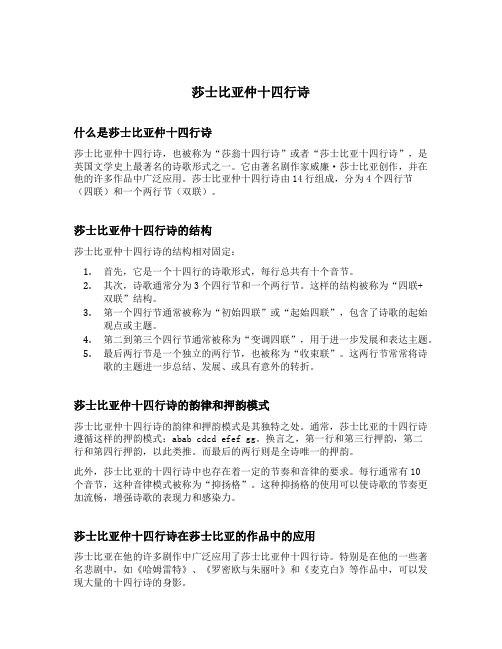
莎士比亚仲十四行诗什么是莎士比亚仲十四行诗莎士比亚仲十四行诗,也被称为“莎翁十四行诗”或者“莎士比亚十四行诗”,是英国文学史上最著名的诗歌形式之一。
它由著名剧作家威廉·莎士比亚创作,并在他的许多作品中广泛应用。
莎士比亚仲十四行诗由14行组成,分为4个四行节(四联)和一个两行节(双联)。
莎士比亚仲十四行诗的结构莎士比亚仲十四行诗的结构相对固定:1.首先,它是一个十四行的诗歌形式,每行总共有十个音节。
2.其次,诗歌通常分为3个四行节和一个两行节。
这样的结构被称为“四联+双联”结构。
3.第一个四行节通常被称为“初始四联”或“起始四联”,包含了诗歌的起始观点或主题。
4.第二到第三个四行节通常被称为“变调四联”,用于进一步发展和表达主题。
5.最后两行节是一个独立的两行节,也被称为“收束联”。
这两行节常常将诗歌的主题进一步总结、发展、或具有意外的转折。
莎士比亚仲十四行诗的韵律和押韵模式莎士比亚仲十四行诗的韵律和押韵模式是其独特之处。
通常,莎士比亚的十四行诗遵循这样的押韵模式:abab cdcd efef gg。
换言之,第一行和第三行押韵,第二行和第四行押韵,以此类推。
而最后的两行则是全诗唯一的押韵。
此外,莎士比亚的十四行诗中也存在着一定的节奏和音律的要求。
每行通常有10个音节,这种音律模式被称为“抑扬格”。
这种抑扬格的使用可以使诗歌的节奏更加流畅,增强诗歌的表现力和感染力。
莎士比亚仲十四行诗在莎士比亚的作品中的应用莎士比亚在他的许多剧作中广泛应用了莎士比亚仲十四行诗。
特别是在他的一些著名悲剧中,如《哈姆雷特》、《罗密欧与朱丽叶》和《麦克白》等作品中,可以发现大量的十四行诗的身影。
莎士比亚将莎士比亚仲十四行诗作为舞台表演的一种形式,用来表达角色的情感、思想和内心世界。
他巧妙地运用了四联和双联的结构,使得诗歌更具有戏剧性和表现力。
通过使用押韵和节奏,莎士比亚使得诗歌更引人入胜,引起观众的共鸣。
莎士比亚仲十四行诗的意义和影响莎士比亚仲十四行诗的创作为英国文学史做出了重要贡献。
莎士比亚十四行诗欣赏

莎士比亚十四行诗欣赏莎士比亚是英国文学史上最杰出的戏剧家,也是西方文艺史上最杰出的作家之一,全世界最卓越的文学家之一。
他流传下来的作品包括37部戏剧、155首十四行诗、两首长叙事诗和其他诗歌。
他的戏剧有各种主要语言的译本,且表演次数远远超过其他任何戏剧家的作品。
下面是店铺为大家带来莎士比亚经典十四行诗欣赏,希望大家喜欢!莎士比亚十四行诗:O me, what eyes hath Love put in my head,Which have no correspondence with true sight!Or, if they have, where is my judgment fled,That censures falsely what they see aright?If that be fair whereon my false eyes dote,What means the world to say it is not so?If it be not, then love doth well denoteLove's eye is not so true as all men's 'No.'How can it? O, how can Love's eye be true,That is so vex'd with watching and with tears?No marvel then, though I mistake my view;The sun itself sees not till heaven clears.O cunning Love! with tears thou keep'st me blind,Lest eyes well-seeing thy foul faults should find.唉,爱把什么眼睛装在我脑里,使我完全认不清真正的景象?竟错判了眼睛所见到的真相?如果我眼睛所迷恋的真是美,为何大家都异口同声不承认?若真不美呢,那就绝对无可讳,爱情的眼睛不如一般人看得真:当然喽,它怎能够,爱眼怎能够看得真呢,它日夜都泪水汪汪?那么,我看不准又怎算得稀有?太阳也要等天晴才照得明亮。
莎翁十四行诗精选译文

莎翁十四行诗精选译文莎士比亚十四行诗都是一座难以逾越的巅峰,当得起空前绝后的美名。
下面是店铺为大家带来莎翁十四行诗精选译文,欢迎大家阅读欣赏!莎翁十四行诗精选1Not from the stars do I my judgement pluck,我的判断并不是来自星象中;And yet methinks I have astronomy;不过我想我自有占星的学说,But not to tell of good or evil luck,可是我不用它来卜命运的吉凶,Of plagues, of dearths, or seasons' quality;卜疫疠、灾荒或季候的品格;Nor can I fortune to brief minutes tell,我也不会给一刻刻时光掐算,Pointing to each his thunder, rain, and wind,因为我没有从天上得到过启示,Or say with princes if it shall go well指不出每分钟前途的风雨雷电,By oft predict that I in heaven find.道不出帝王将相的时运趋势:But from thine eyes my knowledge I derive,但是我从你眼睛里引出知识,And, constant stars, in them I read such art从这不变的恒星中学到这学问,As truth and beauty shall together thrive说是美与真能够共同繁滋,If from thyself to store thou wouldst convert:只要你能够转入永久的仓廪;Or else of thee this I prognosticate,如若不然,我能够这样预言你:Thy end is truth's and beauty's doom and date.你的末日,就是真与美的死期。
莎翁十四行诗精选

莎翁十四行诗精选莎翁的十四行诗已令读者叹为观止,极大地影响了他那个时代甚至于如今的文人和文学爱好者,给人真、善、美的享受和心灵的启迪。
下面是店铺为大家带来莎翁十四行诗精选,欢迎大家阅读欣赏!莎翁十四行诗精选1:Betwixt mine eye and heart a league is took,现在我的眼和心缔结了同盟,And each doth good turns now unto the other:为的是互相帮忙和互相救济:When that mine eye is famish'd for a look,当眼儿渴望要一见你的尊容,Or heart in love with sighs himself doth smother,或痴情的心快要给叹气窒息,With my love's picture then my eye doth feast眼儿就把你的画像大摆筵桌,And to the painted banquet bids my heart;邀请心去参加这图画的盛宴;Another time mine eye is my heart's guest有时候眼睛又是心的座上客,And in his thoughts of love doth share a part:去把它缱绻的情思平均分沾:So, either by thy picture or my love,这样,或靠你的像或我的依恋,Thyself away art resent still with me;你本人虽远离还是和我在一起;For thou not farther than my thoughts canst move,你不能比我的情思走得更远,And I am still with them and they with thee;我老跟着它们,它们又跟着你;Or, if they sleep, thy picture in my sight或者,它们倘睡着,我眼中的像Awakes my heart to heart's and eye's delight.就把心唤醒,使心和眼都舒畅。
莎士比亚十四行诗原文译文探析

莎士比亚十四行诗原文译文探析莎士比亚(William Shakespeare)是英国文学史上最伟大的剧作家之一,他的作品涵盖了多种题材和风格。
他的十四行诗被认为是他最具影响力的作品之一,也是他最著名的作品之一。
本文将探析几首莎士比亚的十四行诗的原文和译文,并对其进行解读和分析。
莎士比亚的十四行诗通常采用带有特定押韵格式的诗体,每行诗由十个音节(五对抑扬格)组成。
这种押韵格式被称为“莎士比亚诗体”或“英文十四行诗”。
莎士比亚的十四行诗主题涉及爱情、时间、美丽和死亡等广泛的话题,同时通过精炼的语言和演绎力强的形象描绘给读者深刻的印象。
首先让我们来看一首莎士比亚的十四行诗《当时所有最美丽的东西》,其原文如下:这首诗是莎士比亚的一首十分经典的爱情诗,表达了诗人对爱人美丽不朽的赞美。
诗中,诗人用夏日与爱人进行类比,并通过对夏日的描绘暗示出夏日的不完美与短暂。
与夏日相比,爱人的美丽更加温和和可贵。
诗人通过强烈的比较,表达了对爱人美丽的欣赏和爱恋的深度。
诗人还表达了对爱人不朽之美的赞赏。
诗中的“thy eternal summer shall not fade”表明爱人的美丽将永不褪色。
而最后两句“so long as men can breathe or eyes can see, so long lives this, and this gives life to thee.”则意味着这首诗将永远存在,并赋予了爱人永恒的生命。
下面是这首诗的中文译文:我可将你比喻为一个夏日吗?你比夏日更可爱、更温和:七月的风暴震动五月的爱芽,而夏日的租期太短暂:天空的眼睛有时炙热明亮,他的金色面容经常暗淡;美好婀娜终究会凋零,因时间流转,自然遗散;然而你永恒的夏天永不褪色,不失去拥有你这份美丽;死亡也别炫耀你走过阴影,因为你在永恒的诗歌里成长:只要人们呼吸、眼睛可见,它将长存,因它赋予你生命。
这个译文着重保持了原诗的意境和韵律,准确传达了原诗的主旨和情感。
莎士比亚 十四行诗

莎士比亚十四行诗莎士比亚十四行诗如下:1、shakespeare sonnet 12莎士比亚十四行诗when i do count the clock that tells the time,and see the brave day sunk in hideous night;when i behold the violet past prime,and sable curls all silver'd o'er with white: when lofty trees i see barren of leaves,which erst from heat did canopy the herd,and summer's green, all girded up in sheaves,born on the bier with white and bristly beard; then of thy beauty do i question make,that thou among the wastes of time must go,since sweets and beauties do themselves forsake, and die as fast as they see others grow;and nothing 'gainst time's scythe can make defence save breed, to brave him when he takes thee hence.翻译:当我数着壁上报时的自鸣钟,见明媚的白昼坠入狰狞的夜,当我凝望着紫罗兰老了春容,青丝的卷发遍洒着皑皑白雪;当我看见参天的树枝叶尽脱,它不久前曾荫蔽喘息的牛羊;夏天的青翠一束一束地就缚,带着坚挺的白须被舁上殓床;于是我不禁为你的朱颜焦虑:终有天你要加入时光的废堆,既然美和芳菲都把自己抛弃,眼看着别人生长自己却枯萎;没什么抵挡得住时光的毒手,除了生育,当他来要把你拘走。
莎翁十四行诗一首(原文及译文)
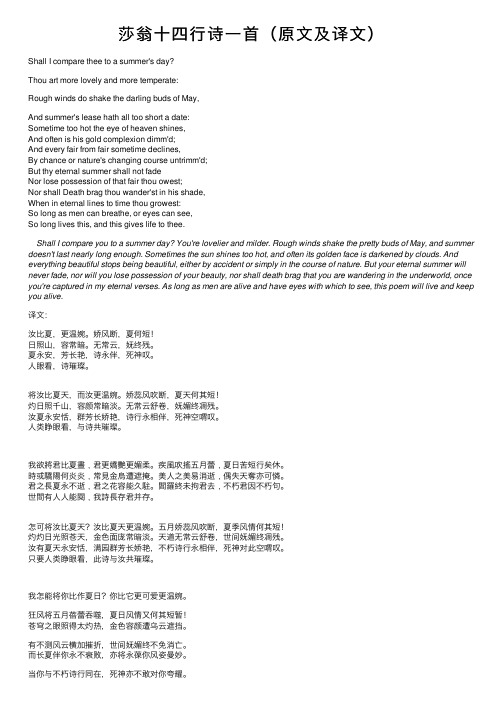
莎翁⼗四⾏诗⼀⾸(原⽂及译⽂)Shall I compare thee to a summer's day?Thou art more lovely and more temperate:Rough winds do shake the darling buds of May,And summer's lease hath all too short a date:Sometime too hot the eye of heaven shines,And often is his gold complexion dimm'd;And every fair from fair sometime declines,By chance or nature's changing course untrimm'd;But thy eternal summer shall not fadeNor lose possession of that fair thou owest;Nor shall Death brag thou wander'st in his shade,When in eternal lines to time thou growest:So long as men can breathe, or eyes can see,So long lives this, and this gives life to thee.Shall I compare you to a summer day? You're lovelier and milder. Rough winds shake the pretty buds of May, and summer doesn't last nearly long enough. Sometimes the sun shines too hot, and often its golden face is darkened by clouds. And everything beautiful stops being beautiful, either by accident or simply in the course of nature. But your eternal summer will never fade, nor will you lose possession of your beauty, nor shall death brag that you are wandering in the underworld, once you're captured in my eternal verses. As long as men are alive and have eyes with which to see, this poem will live and keep you alive.译⽂:汝⽐夏,更温婉。
莎士比亚十四行诗带翻译

莎士比亚十四行诗带翻译莎士比亚的十四行诗语汇丰富、用词洗练、比喻新颖、结构巧妙、音调铿锵悦耳、张弛有度,让人印象深刻。
下面是店铺为大家带来莎士比亚十四行诗带翻译,供大家阅读欣赏!莎士比亚十四行诗1Then let not winter's ragged hand deface你还没提炼出香精,那你就别让In thee thy summer ere thou be distilled.严冬的粗手来抹掉你脸上的盛夏:Make sweet some vial; treasure thou some place你教玉瓶生香吧;用美的宝藏With beauty's treasure ere it be self-killed.使福地生光吧,趁它还没有自杀。
That use is not forbidden usury取这种重利并不是犯禁放高利贷,Which happies those that pay the willing loan;它能够教愿意还债的人们高兴;That's for thyself to breed another thee,这正是要你生出另一个你来,Or ten times happier be it ten for one.或高兴十倍,要是你一人生十人;Ten times thyself were happier than thou art,你十个儿女描画你十幅肖像,If ten of thine ten times refigured thee:你就要比你独个儿添十倍欢乐:Then what could death do if thou shouldst depart,你将来去世时,死神能把你怎样,Leaving thee living in posterity?既然在后代身上你永远存活?Be not self-willed, for thou art much too fair,别刚愎自用,你太美丽了,不应该To be death's conquest and make worms thine heir.让死神掳去、教蛆虫做你的后代。
莎士比亚经典十四行诗带翻译

莎士比亚经典十四行诗带翻译莎士比亚的十四行诗已令读者叹为观止,极大地影响了他那个时代甚至于如今的文人和文学爱好者,给人真、善、美的享受和心灵的启迪。
那么你想欣赏一下莎士比亚的经典十四行诗吗?下面是店铺为大家带来莎士比亚经典十四行诗带翻译,欢迎大家阅读!Ah! wherefore with infection should he live,唉,我的爱为什么要和臭腐同居,And with his presence grace impiety,把他的绰约的丰姿让人亵渎,That sin by him advantage should achieve以至罪恶得以和他结成伴侣,And lace itself with his society?涂上纯洁的外表来眩耀耳目?Why should false painting imitate his cheek骗人的脂粉为什么要替他写真,And steal dead seeing of his living hue?从他的奕奕神采偷取死形似?Why should poor beauty indirectly seek为什么,既然他是玫瑰花的真身,Roses of shadow, since his rose is true?可怜的美还要找玫瑰的影子?Why should he live, now Nature bankrupt is,为什么他得活着,当造化破了产,Beggar'd of blood to blush through lively veins?缺乏鲜血去灌注淡红的脉络?For she hath no excheckr now but his,因为造化现在只有他作富源,And, proud of many, lives upon his gains.自夸富有,却靠他的利润过活。
O, him she stores, to show what wealth she had 哦,她珍藏他,为使荒歉的今天In days long since, before these last so bad.认识从前曾有过怎样的丰年。
莎翁经典十四行诗

莎翁经典十四行诗莎士比亚是英国文学史上最杰出的戏剧家,也是西方文艺史上最杰出的作家之一,全世界最卓越的文学家之一。
他流传下来的作品包括37部戏剧、155首十四行诗、两首长叙事诗和其他诗歌。
他的戏剧有各种主要语言的译本,且表演次数远远超过其他任何戏剧家的作品。
下面是店铺为大家带来莎翁经典十四行诗,希望大家喜欢!莎翁经典十四行诗:When in the chronicle of wasted timeI see descriptions of the fairest wights,And beauty making beautiful old rhymeIn praise of ladies dead and lovely knights,Then, in the blazon of sweet beauty's best,Of hand, of foot, of lip, of eye, of brow,I see their antique pen would have express'dEven such a beauty as you master now.So all their praises are but propheciesOf this our time, all you prefiguring;And, for they look'd but with divining eyes,They had not skill enough your worth to sing:For we, which now behold these present days,Had eyes to wonder, but lack tongues to praise.当我从那湮远的古代的纪年发见那绝代风流人物的写真,艳色使得古老的歌咏也香艳,颂赞着多情骑士和绝命佳人,于是,从那些国色天姿的描画,无论手脚、嘴唇、或眼睛或眉额,我发觉那些古拙的笔所表达恰好是你现在所占领的姿色。
- 1、下载文档前请自行甄别文档内容的完整性,平台不提供额外的编辑、内容补充、找答案等附加服务。
- 2、"仅部分预览"的文档,不可在线预览部分如存在完整性等问题,可反馈申请退款(可完整预览的文档不适用该条件!)。
- 3、如文档侵犯您的权益,请联系客服反馈,我们会尽快为您处理(人工客服工作时间:9:00-18:30)。
莎翁十四行诗by William Shakespeare1From fairest creatures we desire increase,That thereby beauty's rose might never die,But as the riper should by time decease,His tender heir might bear his memory:But thou contracted to thine own bright eyes, Feed'st thy light's flame with self-substantial fuel, Making a famine where abundance lies,Thy self thy foe, to thy sweet self too cruel: Thou that art now the world's fresh ornament, And only herald to the gaudy spring,Within thine own bud buriest thy content,And tender churl mak'st waste in niggarding:Pity the world, or else this glutton be,To eat the world's due, by the grave and thee.2When forty winters shall besiege thy brow,And dig deep trenches in thy beauty's field,Thy youth's proud livery so gazed on now,Will be a tattered weed of small worth held: Then being asked, where all thy beauty lies, Where all the treasure of thy lusty days;To say within thine own deep sunken eyes, Were an all-eating shame, and thriftless praise.How much more praise deserved thy beauty's use, If thou couldst answer 'This fair child of mineShall sum my count, and make my old excuse' Proving his beauty by succession thine.This were to be new made when thou art old,And see thy blood warm when thou feel'st it cold. 二3Look in thy glass and tell the face thou viewest, Now is the time that face should form another, Whose fresh repair if now thou not renewest, Thou dost beguile the world, unbless some mother. For where is she so fair whose uneared womb Disdains the tillage of thy husbandry?Or who is he so fond will be the tomb,Of his self-love to stop posterity?Thou art thy mother's glass and she in theeCalls back the lovely April of her prime,So thou through windows of thine age shalt see, Despite of wrinkles this thy golden time.But if thou live remembered not to be,Die single and thine image dies with thee.4Unthrifty loveliness why dost thou spend,Upon thy self thy beauty's legacy?Nature's bequest gives nothing but doth lend,And being frank she lends to those are free:Then beauteous niggard why dost thou abuse,The bounteous largess given thee to give?Profitless usurer why dost thou useSo great a sum of sums yet canst not live?For having traffic with thy self alone,Thou of thy self thy sweet self dost deceive,Then how when nature calls thee to be gone,What acceptable audit canst thou leave?Thy unused beauty must be tombed with thee, Which used lives th' executor to be.5Those hours that with gentle work did frameThe lovely gaze where every eye doth dwellWill play the tyrants to the very same,And that unfair which fairly doth excel:For never-resting time leads summer onTo hideous winter and confounds him there,Sap checked with frost and lusty leaves quite gone, Beauty o'er-snowed and bareness every where:Then were not summer's distillation leftA liquid prisoner pent in walls of glass,Beauty's effect with beauty were bereft,Nor it nor no remembrance what it was.But flowers distilled though they with winter meet, Leese but their show, their substance still lives sweet.6Then let not winter's ragged hand deface,In thee thy summer ere thou be distilled:Make sweet some vial; treasure thou some place, With beauty's treasure ere it be self-killed:That use is not forbidden usury,Which happies those that pay the willing loan;That's for thy self to breed another thee,Or ten times happier be it ten for one,Ten times thy self were happier than thou art,If ten of thine ten times refigured thee:Then what could death do if thou shouldst depart, Leaving thee living in posterity?Be not self-willed for thou art much too fair,To be death's conquest and make worms thine heir.7Lo in the orient when the gracious lightLifts up his burning head, each under eyeDoth homage to his new-appearing sight,Serving with looks his sacred majesty,And having climbed the steep-up heavenly hill, Resembling strong youth in his middle age,Yet mortal looks adore his beauty still,Attending on his golden pilgrimage:But when from highmost pitch with weary car,Like feeble age he reeleth from the day,The eyes (fore duteous) now converted areFrom his low tract and look another way:So thou, thy self out-going in thy noon:Unlooked on diest unless thou get a son.8Music to hear, why hear'st thou music sadly? Sweets with sweets war not, joy delights in joy: Why lov'st thou that which thou receiv'st not gladly, Or else receiv'st with pleasure thine annoy?If the true concord of well-tuned sounds,By unions married do offend thine ear,They do but sweetly chide thee, who confoundsIn singleness the parts that thou shouldst bear: Mark how one string sweet husband to another, Strikes each in each by mutual ordering; Resembling sire, and child, and happy mother, Who all in one, one pleasing note do sing:Whose speechless song being many, seeming one, Sings this to thee, 'Thou single wilt prove none'.9Is it for fear to wet a widow's eye,That thou consum'st thy self in single life?Ah, if thou issueless shalt hap to die,The world will wail thee like a makeless wife,The world will be thy widow and still weep,That thou no form of thee hast left behind,When every private widow well may keep,By children's eyes, her husband's shape in mind: Look what an unthrift in the world doth spendShifts but his place, for still the world enjoys it;But beauty's waste hath in the world an end,And kept unused the user so destroys it:No love toward others in that bosom sitsThat on himself such murd'rous shame commits.10For shame deny that thou bear'st love to anyWho for thy self art so unprovident.Grant if thou wilt, thou art beloved of many,But that thou none lov'st is most evident:For thou art so possessed with murd'rous hate,That 'gainst thy self thou stick'st not to conspire, Seeking that beauteous roof to ruinateWhich to repair should be thy chief desire:O change thy thought, that I may change my mind, Shall hate be fairer lodged than gentle love?Be as thy presence is gracious and kind,Or to thy self at least kind-hearted prove,Make thee another self for love of me,That beauty still may live in thine or thee.11As fast as thou shalt wane so fast thou grow'st,In one of thine, from that which thou departest,And that fresh blood which youngly thou bestow'st, Thou mayst call thine, when thou from youth convertest, Herein lives wisdom, beauty, and increase,Without this folly, age, and cold decay,If all were minded so, the times should cease,And threescore year would make the world away:Let those whom nature hath not made for store, Harsh, featureless, and rude, barrenly perish:Look whom she best endowed, she gave thee more; Which bounteous gift thou shouldst in bounty cherish: She carved thee for her seal, and meant thereby,Thou shouldst print more, not let that copy die.一一12When I do count the clock that tells the time,And see the brave day sunk in hideous night,When I behold the violet past prime,And sable curls all silvered o'er with white:When lofty trees I see barren of leaves,Which erst from heat did canopy the herdAnd summer's green all girded up in sheavesBorne on the bier with white and bristly beard:Then of thy beauty do I question makeThat thou among the wastes of time must go,Since sweets and beauties do themselves forsake, And die as fast as they see others grow,And nothing 'gainst Time's scythe can make defence Save breed to brave him, when he takes thee hence.13O that you were your self, but love you areNo longer yours, than you your self here live, Against this coming end you should prepare,And your sweet semblance to some other give.So should that beauty which you hold in leaseFind no determination, then you wereYour self again after your self's decease,When your sweet issue your sweet form should bear. Who lets so fair a house fall to decay,Which husbandry in honour might uphold,Against the stormy gusts of winter's dayAnd barren rage of death's eternal cold?O none but unthrifts, dear my love you know,You had a father, let your son say so.14Not from the stars do I my judgement pluck,And yet methinks I have astronomy,But not to tell of good, or evil luck,Of plagues, of dearths, or seasons' quality,Nor can I fortune to brief minutes tell;Pointing to each his thunder, rain and wind,Or say with princes if it shall go wellBy oft predict that I in heaven find.But from thine eyes my knowledge I derive,And constant stars in them I read such artAs truth and beauty shall together thriveIf from thy self, to store thou wouldst convert:Or else of thee this I prognosticate,Thy end is truth's and beauty's doom and date.15When I consider every thing that growsHolds in perfection but a little moment.That this huge stage presenteth nought but shows Whereon the stars in secret influence comment. When I perceive that men as plants increase, Cheered and checked even by the self-same sky: Vaunt in their youthful sap, at height decrease, And wear their brave state out of memory.Then the conceit of this inconstant stay,Sets you most rich in youth before my sight, Where wasteful time debateth with decayTo change your day of youth to sullied night,And all in war with Time for love of you,As he takes from you, I engraft you new.16But wherefore do not you a mightier wayMake war upon this bloody tyrant Time?And fortify your self in your decayWith means more blessed than my barren rhyme? Now stand you on the top of happy hours,And many maiden gardens yet unset,With virtuous wish would bear you living flowers, Much liker than your painted counterfeit:So should the lines of life that life repairWhich this (Time's pencil) or my pupil pen Neither in inward worth nor outward fairCan make you live your self in eyes of men.To give away your self, keeps your self still,And you must live drawn by your own sweet skill.17Who will believe my verse in time to comeIf it were filled with your most high deserts? Though yet heaven knows it is but as a tomb Which hides your life, and shows not half your parts: If I could write the beauty of your eyes,And in fresh numbers number all your graces,The age to come would say this poet lies,Such heavenly touches ne'er touched earthly faces. So should my papers (yellowed with their age)Be scorned, like old men of less truth than tongue, And your true rights be termed a poet's rage,And stretched metre of an antique song.But were some child of yours alive that time,You should live twice in it, and in my rhyme.18Shall I compare thee to a summer's day?Thou art more lovely and more temperate:Rough winds do shake the darling buds of May, And summer's lease hath all too short a date: Sometime too hot the eye of heaven shines,And often is his gold complexion dimmed,And every fair from fair sometime declines,By chance, or nature's changing course untrimmed:But thy eternal summer shall not fade,Nor lose possession of that fair thou ow'st,Nor shall death brag thou wand'rest in his shade, When in eternal lines to time thou grow'st,So long as men can breathe or eyes can see,So long lives this, and this gives life to thee.19Devouring Time blunt thou the lion's paws,And make the earth devour her own sweet brood, Pluck the keen teeth from the fierce tiger's jaws, And burn the long-lived phoenix, in her blood, Make glad and sorry seasons as thou fleet'st,And do whate'er thou wilt swift-footed TimeTo the wide world and all her fading sweets:But I forbid thee one most heinous crime,O carve not with thy hours my love's fair brow, Nor draw no lines there with thine antique pen, Him in thy course untainted do allow,For beauty's pattern to succeeding men.Yet do thy worst old Time: despite thy wrong,My love shall in my verse ever live young.20A woman's face with nature's own hand painted, Hast thou the master mistress of my passion,A woman's gentle heart but not acquaintedWith shifting change as is false women's fashion, An eye more bright than theirs, less false in rolling: Gilding the object whereupon it gazeth,A man in hue all hues in his controlling, Which steals men's eyes and women's souls amazeth. And for a woman wert thou first created,Till nature as she wrought thee fell a-doting,And by addition me of thee defeated,By adding one thing to my purpose nothing.But since she pricked thee out for women's pleasure, Mine be thy love and thy love's use their treasure.。
